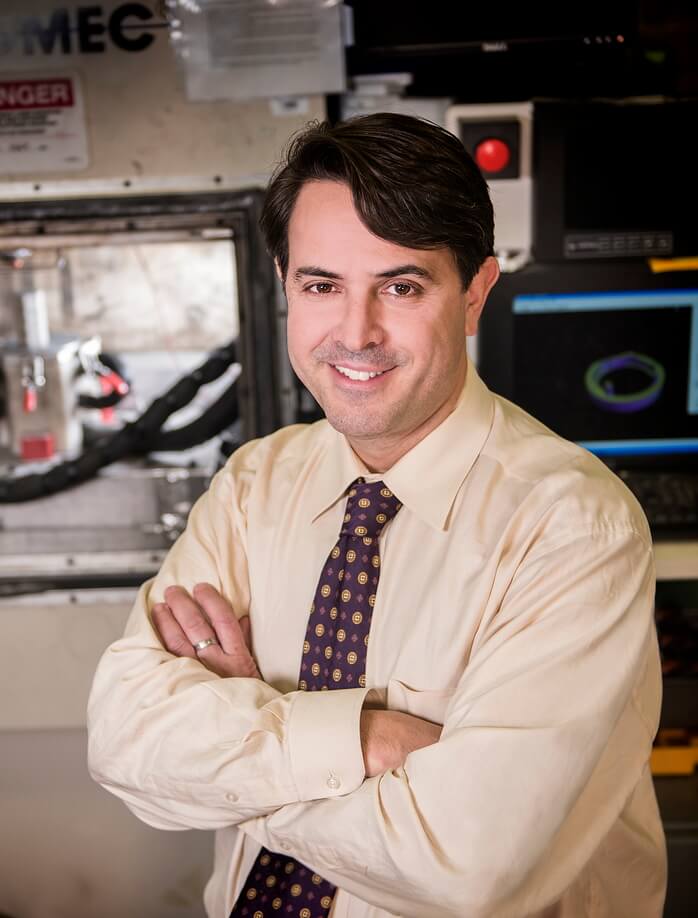DeKalb, Ill. — Surrounded by 3D printers in a space designed to challenge and inspire, Todd Durham feels at home.
The mechanical engineering major from Genoa spends much of his time in the College of Engineering and Engineering Technology’s new Maker Space. He and his fellow classmates are on the cutting edge of a booming industry.
Also known as additive manufacturing, 3D printing is an industry where design possibilities once dreamed of by engineers are becoming reality.

“It’s just crazy to think I’m a sophomore in college and I’m actually consulting with a real company, helping them to develop an actual product,” said mechanical engineering major Todd Durham of Genoa. “It’s a real-world example of what we’re doing here.” Source: Northern Illinois Univeristy
The experience students are gaining extends far beyond the lab.
Essentially, through partnerships between the college and technology companies and businesses, they’re already doing the jobs their degrees would help them obtain. They’re tinkerers, inventors, designers meticulously molding objects from the ground up.
Through the college’s latest collaboration, students are working to leverage the advantages of 3D printing.
They’re working to reduce the parts count by consolidating components and producing lighter weight printed components for RadMax’s proprietary axial vane, rotary devices. RadMax is a research and product development company based in Spokane, Washington, and owned by Regi U.S., Inc.
“It’s just crazy to think I’m a sophomore in college and I’m actually consulting with a real company, helping them to develop an actual product,” Durham said. “It’s a real-world example of what we’re doing here.”
Shaping the industry’s future
Designing a broad line of rotary engines, compressors, pumps and gas expanders for civilian, commercial and government applications, RadMax aims to develop products that are smaller, lighter and more energy-efficient than incumbent technologies.
That’s where 3D printing and NIU come into play.
Under the direction of Federico Sciammarella, associate professor and interim chair for Mechanical Engineering, students are working to produce a 3D metal-printed fully functional RadMax refrigerant gas expander prototype. The expander will replace pressure regulation and other throttling type valves now used in air conditioning/refrigeration, natural gas, steam and other pressurized gas applications.

Global research in metal 3D printing done by Federico Sciammarella, associate professor and interim chair for Mechanical Engineering, has helped bring real-world opportunities to students. Source: Northern Illinois University
“It’s similar to an internship experience,” said Matt McCoy, a sophomore mechanical engineering student from Downers Grove. McCoy has worked alongside Durham, as well as senior mechanical engineering student Tommy Corbett of Genoa, on the project.
“They’re colleagues in a sense,” he said of RadMax. “We’re working directly with the engineers at this company. We’re asking them questions. They’re asking us questions.”
RadMax will compare the device NIU creates to those manufactured via traditional methods in the areas of production speed, cost, weight, parts count, strength, performance and overall efficiency.
“The capability to 3D print will also shorten product development timelines by dramatically reducing the time and cost of manufacturing and testing new concepts and designs in current and future RadMax devices,” said Paul Porter, RadMax’s chief technology officer.
It’s all about understanding the role 3D printing can play in RadMax’s long-term manufacturing strategy. Students are shaping the industry’s future.
“I think the fact the students have the flexibility and freedom to explore the technology allows us to explore the boundaries,” said Sciammarella, whose global research in metal 3D printing helps bring these real-world opportunities to students. “That’s been our goal all along with the Maker Space, to let them have a place where they can grow and learn and explore.”
3D creations find homes elsewhere
Since the Maker Space opened in 2017, students have designed and 3D printed items specifically for NIU, such as plaques, a broken part of the scoreboard at Huskie Stadium and parts to help make the OneCard readers in campus laundry rooms accessible to people with disabilities, and elsewhere.
Another future project involves a partnership with the McHenry County Historical Society to 3D print missing parts of antiques and other historic objects for display.
“I thought it would be a great opportunity to highlight the past with new 3D technology,” said Kira Stell, curator for the McHenry County Historical Society, who intends to put the students’ 3D creations—a one-room school hand bell, a candle stick holder and a tin lantern—on display in May at the museum.

“Everyone has a great GPA,” said senior Thomas Corbett of the advantage his 3D-printing experience has given him as he pursues a Ph.D. program. “It’s nice to also have the physical hands-on experience and develop a set of skills.” Source: Northern Illinois University
“I will have the original artifacts on display, and the public can touch the 3D replica,” she said.
The work Corbett has done as a leader in the Maker Space has helped distinguish him as he pursues a Ph.D. program. “Everyone has a great GPA,” he said. “It’s nice to also have the physical hands-on experience and develop a set of skills.”
The collaboration with RadMax is expected to run through 2019. RadMax’s military and aerospace consultant James Metzger came up with the idea for the NIU collaboration as he promoted additive manufacturing to reduce parts inventory and weight, while enhancing field readiness of military equipment.
“This collaboration will lead to new and innovative products not possible with traditional manufacturing that are stronger, lighter and more reliable,” he said.
Media Contact: Jami Kunzer
About NIU
Northern Illinois University is a student-centered, nationally recognized public research university, with expertise that benefits its region and spans the globe in a wide variety of fields, including the sciences, humanities, arts, business, engineering, education, health and law. Through its main campus in DeKalb, Illinois, and education centers for students and working professionals in Chicago, Hoffman Estates, Naperville, Oregon and Rockford, NIU offers more than 100 courses of study while serving a diverse and international student body.

